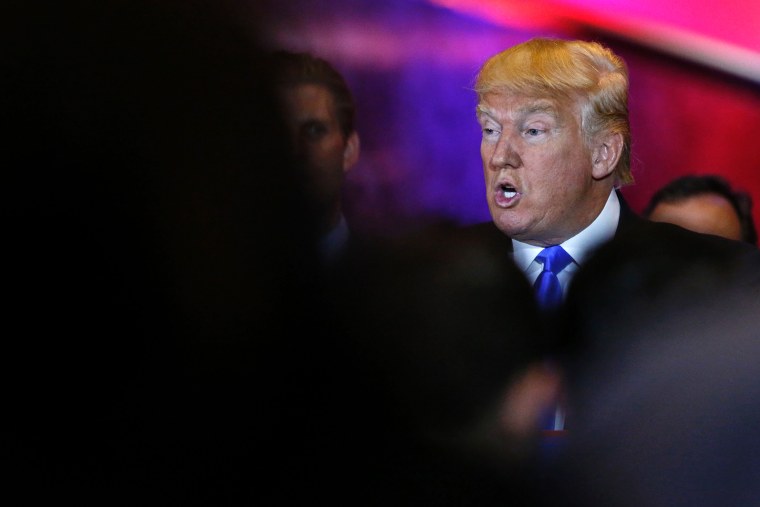Donald Trump, the presumptive Republican nominee, continued to draw fire over the weekend by continuing claims that U.S. District Court Judge Gonzalo Curiel, who is presiding over a lawsuit against Trump University, cannot possibly render a fair verdict due to the judge's Mexican heritage.
"He is a member of a club or society, very strongly pro-Mexican, which is all fine," Trump said Sunday on CBS's "Face the Nation." "But I say he's got bias. I want to build a wall. I'm going to build a wall. I'm doing very well with the Latinos, with the Hispanics, with the Mexicans -- I'm doing very well with them, in my opinion."
Host John Dickerson later asked if Trump thought a Muslim judge would also be biased against him due to Trump's proposal to temporarily ban Muslims from entering the United States.
"It's possible, yes. Yeah. That would be possible, absolutely," Trump said.
Trump has been ramping up his attacks on Curiel for months on the campaign trail. He went after the judge at a rally in Arkansas in late February, saying at first incorrectly, “I believe he happens to be Spanish, which is fine.” Then: “He’s Hispanic — which is fine.”
RELATED: Paul Ryan disavows Trump's attack on judge's 'Mexican heritage'
Trump began a new series of attacks last Friday, calling the judge a "hater" at a San Diego rally (Curiel presides over San Diego) and telling attendees that Curiel, "we believe, is Mexican." Curiel was born in Indiana. Trump followed up later, on Memorial Day, via Twitter:
Trump then defended his charge in the Wall Street Journal, amending his claim that Curiel is a "Mexican" to acknowledge that he is of Mexican heritage.
“I’m building a wall. It’s an inherent conflict of interest,” Trump said, referring to the wall he has pledged to construct between the U.S. and Mexico if elected.
House Speaker Paul Ryan, who endorsed Trump on Thursday, disavowed Trump's attacks on Friday, the same day Trump sat down with CNN's Jake Tapper. Tapper pressed Trump on why Curiel's ethnicity made him unqualified to hear the case, and Trump reiterated that Curiel is Mexican.
"I think I’m going to do very well with Hispanics, but we’re building a wall. He’s a Mexican. We’re building a wall between here and Mexico," Trump said. "The answer is, he is giving us very unfair rulings, rulings that people can’t even believe. This case should have ended years ago."
According to the Washington Post, Tapper had to follow up on the question 23 times to get a straight answer on whether Trump thought that that saying someone couldn't do a job because of his race was the definition of racism. Trump said, "No, I don't think so at all."
Newt Gingrich, a Trump supporter whose name has been floated as a possible vice presidential pick, has also been critical of Trump's attack on Curiel. "I don't know what Trump's reasoning was, and I don't care," Gingrich wrote in an email to the Washington Post. "His description of the judge in terms of his parentage is completely unacceptable."
Democratic front-runner Hillary Clinton, Trump's likely rival in the general election, continued to condemn Trump's attacks on the judge on Sunday, noting Curiel's "impeccable record as a prosecutor" in an interview on ABC's "This Week." On Thursday, Clinton delivered a scorching speech on national security that sharpened her message on Trump's unfitness for the presidency.
"Donald Trump’s ideas aren’t just different – they are dangerously incoherent," Clinton said. "They’re not even really ideas – just a series of bizarre rants, personal feuds and outright lies."
